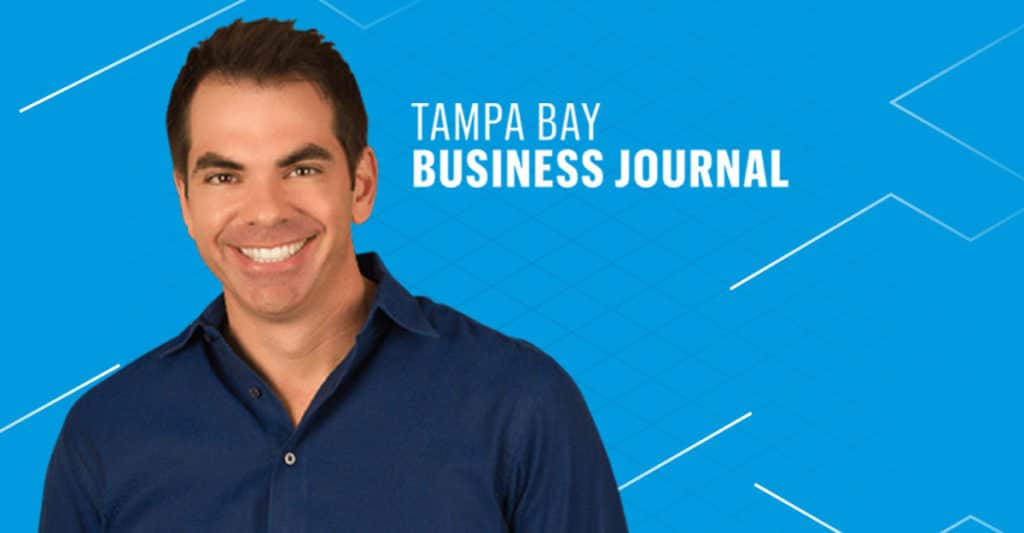
Bobby Harris speaks to nearshoring, consumer demand trends and how fuel costs hit home.

Bobby Harris speaks to nearshoring, consumer demand trends and how fuel costs hit home.
TBBJ
Henry Queen, Reporter
July 1, 2022
There are early signs of decreases in demand within the supply chain, said BlueGrace Logistics CEO Bobby Harris.
Simultaneous phenomena have pushed the prices of goods and services to new highs. The consumer price index for the Tampa-St. Petersburg-Clearwater metro area rose 2.1% from March to May, according the U.S. Bureau of Labor Statistics.
“Demand is starting to come down,” Harris said. “There’s no doubt about it. There’s a lot left to be learned in the coming months to see if the economy starts cooling down a little bit more. But we’re certainly seeing the early signs of it as far as the supply chain side.”
BlueGrace, a Riverview-based 3PL founded by Harris in 2009, brought in over $460 million in revenue in 2020, according to Tampa Bay Business Journal research. It’s the 20th largest private company in Tampa Bay.
Harris spoke with the Business Journal a few days before the S&P 500 dipped to bear market territory. Despite fears of a recession, BlueGrace is looking to add 192 people before the end of the year to meet their clients’ needs, Harris said.
How does inflation affect not only your business but the supply chain as a whole? Inflation is playing a big part in what we’re seeing. Specifically, fuel. The national average price of diesel last week was $5.70, which is an all time high. And what happens in the shipping world — and it doesn’t matter, you can name any of the Fortune 100 companies — they pay a fuel surcharge.
If fuel goes up, shipping costs more, and it’s immediately passed on. That’s not something that takes a while.
If fuel goes up, shipping costs more, and it’s immediately passed on. That’s not something that takes a while. And so those goods that get shipped are costing not just a little bit more, but a lot more. Because you have to remember too: Diesel has gone up even more than regular gas. And that’s what really affects the movement of goods in the United States.
Do you see demand dropping from consumers? We’re definitely starting to see some of that. Now, the one interesting things is the ports in China have been locked down for a long time. But in the last few days Shanghai specifically —which is where you want to check if you want to figure things out — they’ve unlocked their ports. They’re getting back up to full capacity. You’re now going to start seeing more gridlock coming out of China, which will create a little bit of a bottleneck here. Capacity will tighten up a little bit. But we expect it to normalize in the coming months, barring any other Covid lockdowns for China. But we do not expect to see energy costs go down anytime in the near future. That’s baked into a lot of people’s predictions of what we’re gonna expect throughout the rest of the year.
How does that shape shippers’ behavior with the high diesel prices that aren’t cooling down? Shippers aren’t worried about, ‘Hey let’s just get it here so that we can have excess inventory.’ When it costs that much to ship, they’re less likely to hold a lot of inventory. One of the complaints of most U.S. consumers right now are wait times. What solves that is having inventory readily available, which seems to be less likely going forward until shipping and supply chain costs come down.
So consumers will have to wait even longer with the possibility of more bottlenecks? Certainly. There’s just such a big reliance on China. Their ports have been a [question mark]. They also have their own inland trucking issues. China’s Covid lockdowns affect the entire world, but especially the United States. What we are seeing is that people do more and more nearshoring. We’re starting to get requests to help model something out. They ask, ‘We’re talking about moving warehouses to Mexico rather than China. How does that affect things?’ People are opening up to that because they don’t see this as something that’s going to pass very soon.
There’s a lot of need for agility in supply chains right now.
How does nearshoring affect your business or how can you help your clients with those goals? Each client has their own need. They put a lot of thought into where to put their production and where to get their manufacturing. In some cases, it is bringing more and more back to the United States. Some of it is different distribution patterns with less or more frequency. And some of it is bringing manufacturing to Mexico or even Vietnam, for that matter. There’s a lot of need for agility in supply chains right now. Because No. 1, it’s very difficult for people to fulfill. And No. 2, it’s very unpredictable. So agility is the most important thing that we can offer our clients.
Given the reliance on China, has the supply chain actually fared pretty well considering their lockdowns? As a society, we’ve gotten better. The struggles have made people sharper and figure out new ways. It has been a struggle, but it’s better than it was.
Get expert logistics insights delivered straight to your inbox
"*" indicates required fields